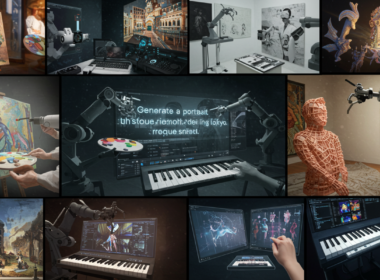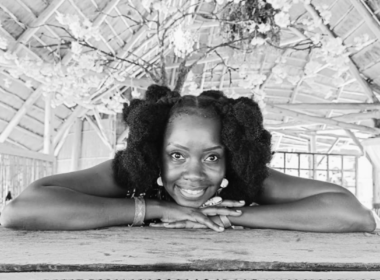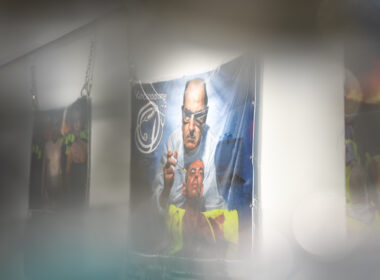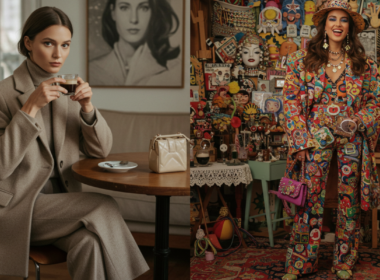Godfrey Egbon, an artist of remarkable versatility, emerged on the scene in 2009 through a captivating collaboration with British photographer Anthony Gayton. This partnership led to the “The Portrait” exhibition at Vienna’s Kunsthalle, marking his entry into the art world. Egbon’s Austrian breakthrough came in 2012 with a nationwide advertising campaign for Light for the World, an organisation he supports as a child sponsor. He later gained recognition in a prominent commercial by Media-Saturn Holding. His career includes collaborations with top photographers, appearances at prestigious events, and a foray into music with the German DJ duo Bodybangers in 2014. In this exclusive interview, we explore how Godfrey Egbon challenges beauty standards, addresses societal complexities, and grapples with the evolving role of technology in the artistic landscape.

Fabl’style: How do you channel the limitations of genres and boundaries to create art that transcends conventional definitions and opens up possibilities for artistic exploration?
Godfrey Egbon: I express my art in different kinds of ways because I find myself in interesting and different kinds of fields, not being bound to society’s expression or definition of art. When you look at big artists, you see what they do and that they do not really care about society’s premises of what art should be. You just go after what you believe is the right thing outside of people’s opinions, and that is actually what I do. Of course, it comes with some limitations in terms of the public’s definition of success. You might not get that because you’re going in your own direction. For example, when I write and produce my music and direct my own photo shoots, I don’t look at what other artists think about it; I look at what art is for me.
Fabl’style: Being part of the diaspora can bring a sense of longing and nostalgia for one’s homeland. How does this sentiment find expression in your own art? How do you cope with the emotional complexity it may bring?
Godfrey Egbon: My roots are Nigerian, and it doesn’t have an impact on how I express myself because everyone grows up differently. I’m grounded in Nigeria, but I’m also grounded in Austria. However, I don’t choose any country; no land makes an impact on how I express my art because it’s just something that develops in my mind. It has no connections to any racial feeling or anything that concerns country of origin.
Fabl’style: Some people believe that diaspora artists should be some kind of diaspora ambassadors to the global world. How do you see your art contributing to the broader narrative of Nigerian culture and its diasporic impact?
Godfrey Egbon: Honestly, that’s not my way of thinking. I understand the part about people being ambassadors to the country. I see this world as one where everyone is the same, no matter where they come from. It has no impact on my personal work. It has an impact on many beautiful works, but for me, it doesn’t have any impact. It’s beautiful to merge different cultures into your works; I love it, but it’s not the kind of expression that flows into my art. I also think being an ambassador shows people that you are evident and that you can do something as Africans, because in the progression of the mind and society, this is slowly declining, depending on the society you are in.
Fabl’style: I see you do a lot of collaborations with photographers and fellow artists; how do you approach the delicate balance between preserving your own unique artistic voice and embracing new perspectives?
Godfrey Egbon: When I’m making collaborations with some music creators, for instance, I do bring in a bunch of ideas. However, in the end, the producer has the last say. When it comes to photo shoots, I’ve learned to let things play out. Sometimes you’re in the spotlight, and sometimes you’re more in the background. Some artists think that in the course of different projects, they have to get the spotlight and put themselves in the position that they want to. I’m not really bothered by such things.

Fabl’style: As an artist with a diverse portfolio, from visual art to music and modelling, how do you navigate the intersections of these art forms, and why do you find them particularly interesting to serve as a channel for you to express different creative identities?
Godfrey Egbon: Before I started modelling, I had already produced beats. I was kinda passionate about music before I started modelling. That’s a passion that has been in me for a long time: writing lyrics, making beats, and producing. It worked out after I had a certain kind of known status in Vienna. I worked for a very big producer, and we sold a very big song that got millions of views and was played in Germany and also in Austria. I have always had different passions. For my personality, it’s a bit boring if I know I have different kinds of gifts and abilities but have to concentrate on one.
Another reason is that you can make much more money if you concentrate on different things in Austria. Austria is not a place where you can just decide to do modelling alone. It’s difficult; you’ll barely make a living out of it. Also, that’s my personal way of expressing my art. If I could decide, I’d surely just be doing modelling, acting, and music on the side. However, making a living out of it is difficult in Austria. It would mean that I would have to get all the casting jobs done. I have to concentrate on different kinds of fields so I can have different sources of income. That’s my way of expressing my art.
Fabl’style: Despite everything, you have still created a spot for humanitarian projects, which gives your art and person a deeper purpose.
Godfrey Egbon: You mean being the godfather to different children in Africa? This is something that I don’t do anymore. I still have my hands on some local stuff. I had about three or four children that I was investing in, and I also worked and campaigned for the company. But currently, I don’t have children anymore.

Fabl’style: At the time, what inspired it and what led to its end?
Godfrey Egbon: What led to its end was kind of financial. So I just concentrated on giving to people in the streets. I also decided to step back from the world of modelling and entertainment to live a calm, normal life. I got married and decided to invest the money in a different way. Not being seen in the spotlight doesn’t mean you aren’t doing it. I now have a different way of approaching the issue of giving.
Fabl’style: You had an exhibition called “Vienna becomes black”. What’s the thought behind this exhibition?
Godfrey Egbon: It was not my idea, and there were no deeper thoughts about it. The photographer was a good friend; he told me he wanted to take pictures of me and my brothers, whom I later introduced to him. He decided he wanted to make a colourful exhibition, inspired by us three brothers.
Fabl’style: As a model, how do you challenge and redefine traditional beauty standards?
Godfrey Egbon: As a black person, there is a lot of racism to experience out there and in the industry. It’s just like that. I have experienced it, and I have heard a lot of professionals talk about their experiences. That’s really a topic. Especially before, about nine to ten years ago, there was the fear of putting a black person on a poster. That’s really something I saw that is present in this country. Not everyone is going to talk openly about it, but if you take a look at the posters, you will see there are almost no black people around. And the reason is usually because their target audiences are not black, and for me, that is another form of beauty standard because they actually care if you’re black or not. It’s an upsetting thing for me.
A lot of things have changed, but some Austrian brands are still scared of putting black people on their posters because they fear their audience is not going to like that. Also, I grew up in an African cosmetic shop owned by my mom. If you look at these models on these products, they are mostly white because of bleaching. This makes you think that being white is the beauty standard, which is absurd.

Fabl’style: The power of music, dance, and visual art to provoke emotions is profound. How do you approach channelling these profound emotions and experiences into your art to communicate some of the things you feel about the subject?
Godfrey Egbon: It depends on how I feel when I’m writing my lyrics. It depends on the kind of emotional state I am in. I generally just try to make myself visible as an artist, and the more visible we make ourselves, the more people will hopefully see the naturalness of bpoc in the industry.
The visibility of black people has been a problem in many parts of Europe because of the target audience. It’s gotten much better, especially after the Black Lives Matter movement. You see a lot of black people in different commercials, and that’s great, but there is still work to be done.
Fabl’style: Globally, technology is the new oil and gas, and we are seeing an increasing fusion of technology and art. How do you see the digital landscape shaping the future of your own artistic expressions?
Godfrey Egbon: I think artificial intelligence might be a problem because you can do almost everything with it. You can create different kinds of entities that actually don’t exist. Personally, it’s quite problematic, and it’s taking creativity out of our minds because we just leave everything to technology, which I don’t think is beneficial for our mental development or the development of the arts. In terms of my art, it’s not gonna change it. I know there are software programmes that can help you do a lot of artistic things in terms of creating beautiful art pictures. There are software programmes that help you do photo manipulation, but I am a fan of picturing something in your mind and creating it on set.

Fabl’style: Are you preparing in any way to prevent AI from taking your job?
Godfrey Egbon: It’s difficult because I can’t do anything about it. Music is one thing. It involves a level of creativity and expression in songwriting. But in modelling, there’s a big fear among models about artificial intelligence taking their jobs. I still think there are lots of things missing with AI, in Photoshop and all, but I feel like once it gets perfected, it’s going to get interesting for us. However, I am not afraid. You’re still going to need people, especially for fashion shows, even if they don’t need real people for certain commercials and advertisements. It’s fascinating, but it’s also quite scary. It’s surely going to take jobs.
Fabl’style: You collaborated with Bodybangers on “No Limits. What can you bring out of that collaboration?
Godfrey Egbon: I tried to reach my contacts through Facebook, and I was surprised when they wrote me back. It was quite a big deal for me. It was simply a sign that I am capable of achieving more. We’re currently in contact again, working on a certain project. We are going to see where things go because the music industry also changes a lot. You have to be very specific with how you do certain songs, and you have to think about how the big record labels will feel about the songs. It takes time to put a good song together, unlike in the past, when you could rush it a bit more. The times have changed. Music is really something for me, but I can’t make money out of it if I don’t make shows.
Fabl’style: You mentioned that you were married. How do you chill and relax? How do you calm your nerves?
Godfrey Egbon: Yes, I was married for over five years, and we separated in 2021. I’ve been seeing my son on a weekly basis. Seeing and spending time with my son relaxes me, as does spending time for myself. Creating music relaxes me too.
Fabl’style: Is there any musical artist that was part of your childhood? Maybe a song that your mom had on repeat?
Godfrey Egbon: Billy Ocean. My mom used to play his music a lot. But in general, my parents also used to play a lot of African traditional music, and I liked it. I really don’t know their names, but I used to enjoy the music.
Fabl’style: Do you have any affiliations with Afropop? Are you even thinking in that direction?
Godfrey Egbon: I’ve been thinking of going into afropop, but my Nigerian English is not quite there. Maybe it’s going to come together, maybe not; time will tell. I’m very happy that the world is getting more exposed to African culture.

Fabl’style: What’s Nigerian English?
Godfrey Egbon: I grew up with it; it’s the real deal. There’s a kind of vibe that the dialect gives the song. The choice of words is a kind of art in itself. For that, you need to be completely rooted linguistically in Nigeria, which I am not.
Fabl’style: If Selena Gomez can do it, don’t you think you can?
Godfrey Egbon: Yes, I think I can. It’s not something I have set my heart to do. It’s something that has been on the sidelines. When I really have the feeling to do it, I can sit down, but it’s not pressing at the moment. It’s just a side thought. You need to be authentic. Of course, you can adapt to it and change, but in terms of music, it’s good to stay true to how you express yourself best.
Fun Zone: #FabFastFive
- Fabl’style: Music or movies
Godfrey: Music
- Fabl’style: What’s your everyday fashion outfit?
Godfrey: Singlet, jeans, and white shoes
- Fabl’style: Summer or Winter
Godfrey: Summer
- Fabl’style: If you could be any animal, what would you be?
Godfrey: Lion
- Fabl’style: Would you consider yourself an introvert or an extrovert?
Godfrey: Both
Related:
From Shy Teen to Runway Queen: Yanet Morales’ Journey in Modelling and Fashion Influencing
Recap: Fabl’style Summer Flair 2023 with Cecile Von Croy and Emerging Talents Milan











